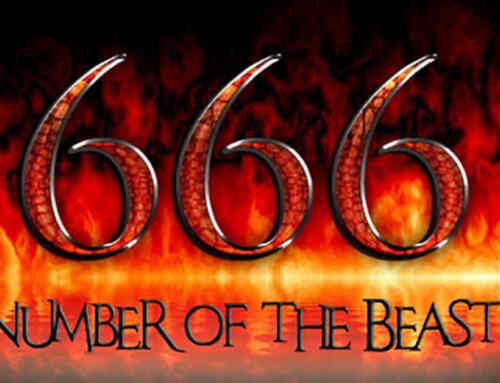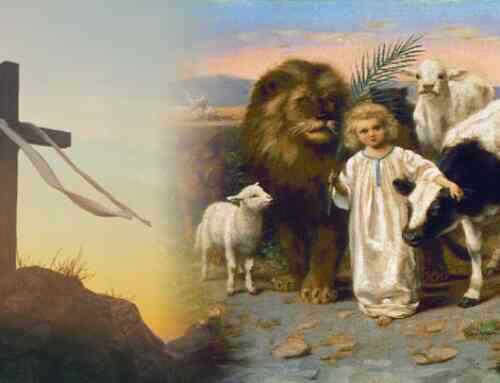We are not of the opinion that there will be one-world government ruled by the antichrist, prior to the great time of trouble spoken of in Daniel 12:1.
The term “antichrist” is mentioned in 1 John 2:18, 22; 4:3 and 2 John 7. But some other references to “antichrist” are “the man of sin,” “the mystery of iniquity,” “that wicked one,” “the son of perdition,” “the beast,” “the man of lawlessness” and “the secret power of lawlessness.” For example, see 2 Thessalonians 2:3-12 and Revelation 13:18.
According to the Greek, “anti” means “in place of,” “instead of,” “a substitution,” or “a correspondence.” It does not mean “against.” Therefore, antichrist means “in place of Christ.” So, who or what is in place of Christ, a person or a governing system?
2 Thessalonians 2:7 helps us understand. Paul says,”For the secret power of lawlessness (meaning the antichrist) is already at work.” In Paul’s day, almost 2,000 years ago, the antichrist (or those who were against the true church) was already at work. The concept of the antichrist in this context indicates that it is not literal, but symbolic of an evil religious system just beginning to bud. Daniel 7 further illustrates this point. In that chapter, the Roman Empire is referred to as a “he.” There is also symbolism describing the characteristics of the antichrist in Revelation 13 which can be compared with Daniel 7 with special focus on “the other horn which came up” (Daniel 7:20) and spoke “great things” and “blasphemies.” This horn seems to represent the antichrist, which came out of the true church.
John (1 John 2:18-22) similarly says there was a development, and the antichrist came out of that development. “They went out from us, but they were not of us.” (1 John 2:19) This scripture helps us see that the antichrist is a counterfeit system coming out of the true church.
Looking at the antichrist from a historical viewpoint, all the major protestant reformers (Huss, Wycliffe, Luther, etc.) up through the mid-1800’s were in unanimous agreement with Peter Waldo, a 12th century pre-reformer who identified the antichrist as a system of falsehood which gradually developed and had its climax in the Papal system. Interestingly, we see almost a reverse idea today. The prevalent thought is that the antichrist is coming as a man who will wreak havoc on the earth, and this havoc will bring about the end. But this viewpoint is not in harmony with what the Scriptures say because the Apostles Paul and John told us the antichrist was already beginning in the first century.
Therefore, we do not believe a one-world government ruled by the antichrist is yet future. We believe the antichrist refers to the Papacy, whose power has waned.
In your second question you asked if there would be a rapture of all Christians prior to the return of Christ. The word “rapture” does not appear anywhere in the Bible. Many Christians have the idea that a rapture will occur when Christ returns, made popular by books and movies. This thought comes from 1 Thessalonians 4:15-17, Luke 17:34-35 and the similar account in Matthew 24. “Two men will be in the field; one will be taken and the other left. Two women will be grinding with a hand mill; one will be taken and the other left” (Matthew 24:40-41).
We understand Jesus to be using word pictures to convey his thought. The “field” represents the world, from which our Lord at his return gathers those who are earnestly seeking him. We do not believe the “taking” is literal, in the sense that one would be changed from a natural being to a spiritual being. Instead, we understand that at Christ’s return, “the one who is taken” is led to the place where the food of truth is to be found. The apostles asked Jesus where this place was. Jesus again replied in symbolic language, “Where there is a dead body, there the vultures (also translated as “eagles”) will gather.” (Luke 17:37) Jesus was explaining that faithful Christians would be gathered to a spiritual feast of scriptural truth when he returns. Some respond to the opportunity (those who are taken) and some do not (those left behind). “Behold, I stand at the door and knock; if any man hears my voice, and open the door, I will come in to him and will sup with him and he with me” (Revelation 3:20). In keeping with one of the signs of his return, Jesus said he would provide “meat in due season” (Matthew 24:45). We believe that such spiritual food is being provided for us today.
What, then, is the meaning of 1 Thessalonians 4:17? “Then we which are alive and remain shall be caught up together with them in the clouds, to meet the Lord in the air.” We believe that the Apostle Paul is telling us that faithful ones who have fallen asleep throughout the Gospel age would be raised first when Christ returned from heaven. Those living at the time of his return would not precede those who slept, but afterward would join them in the same place (1 Thessalonians 4:15). The word “together” in verse 17 means the same place or location (not the same time), just as it does a few verses later when Paul says, “we may live together with him” (1 Thessalonians 5:10). “We shall not all sleep, but we shall all be changed in a moment, in a twinkling of an eye, at the last trump” (1 Corinthians 15:51-52). Thus those Christians who have been sleeping in death for centuries are raised instantaneously upon Christ’s return from heaven. But those of us who die in the Lord now, since his return, join those already in heaven with our Lord.
Will there be a one-world government ruled by the antichrist before the return of Jesus? No, the power of the antichrist climaxed in the Papacy. We believe Christ has already returned and is in the process of tearing down this present evil system and gathering his saints unto him, one saint at a time upon death.
Additional Resources: (PDF) “Can We Identify Antichrist?”
Christian Questions Podcast
Episode #1194: “Could Jesus Return Without You Knowing?”
Revealing the three scripturally progressive phases of Jesus’ return
Preview Video
CQ Rewind Show Notes
Special 3-Part Series: “Do I Suffer From Rapture Anxiety?
Questioning the rapture in the light of careful scriptural analysis
Episode #900: “So, When Does the Rapture Happen?”
Biblically defining texts that seem to teach a rapture


















